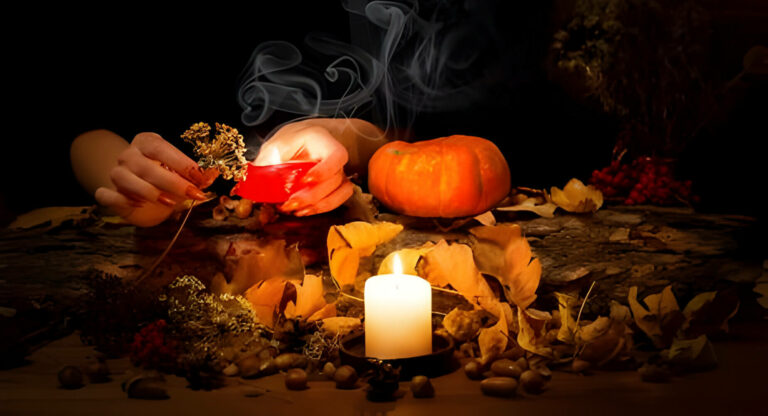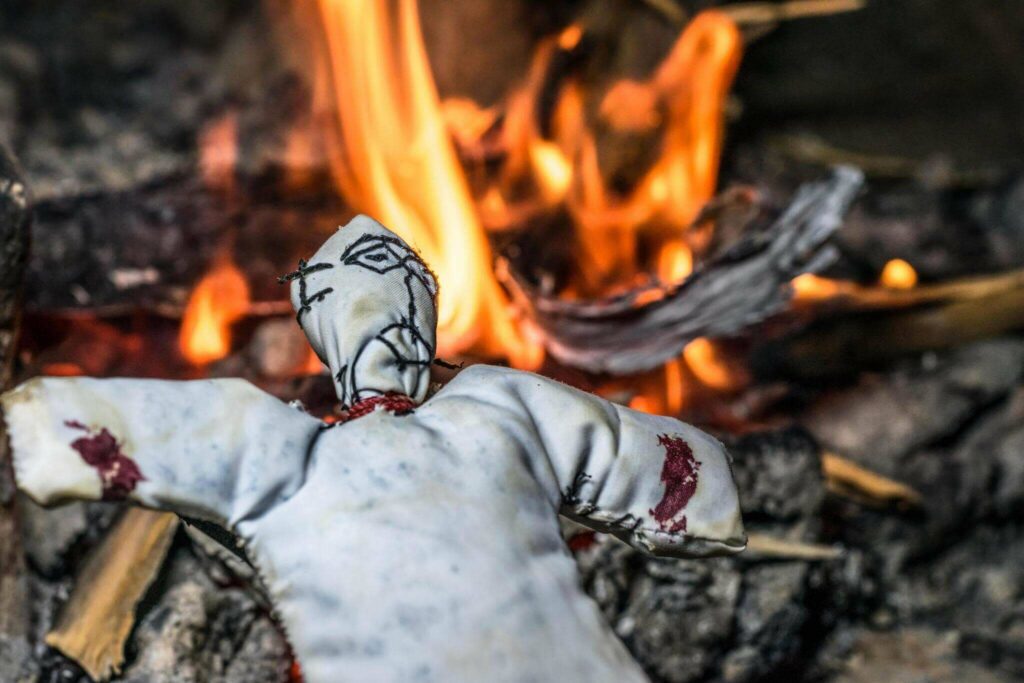Table of Contents
Black magic has long been a topic shrouded in mystery, fear, and intrigue. From ancient texts to modern-day movies, it is depicted as a powerful and dark force. But what is black magic? Is it merely a product of superstition and folklore, or does it have a basis in reality? Let us dive into the heart of these mysteries, using a critical and informative lens.
What is Black Magic?
● Definition and Origins: Black magic is defined as the use of supernatural powers or magic for selfish or evil purposes. It stands in contrast to ‘white magic,’ which aims for beneficial or healing outcomes which is still considered black magic. The origins of black magic can be traced back to ancient civilizations, including the Egyptians, Babylonians, and Romans, who believed in the power of curses and spells. These practices were often interwoven with their religious beliefs and rituals.
● Differentiation from White Magic: While white magic is associated with healing, blessing, and protective spells, black magic is often linked to harm, curses, and the invocation of dark entities. The distinction between black and white magic is not always clear-cut, as the intention behind the magic can blur these lines.
● Common Practices and Beliefs: Practitioners of black magic are believed to engage in various rituals and spells that include:
■ Casting spells to bring about specific outcomes.
■ Curses and hexes aimed at harming or influencing others against their will.
■ Necromancy, or the summoning of spirits and the dead for divination or to achieve personal goals.
■ The creation of trinkets or objects charged with magical energy to cause harm or protect the practitioner from harm.
■ Invocation of demonic or dark spirits to gain power, knowledge, or influence.
● Cultural Significance: The perception of black magic varies significantly across diverse cultures:
■ In some societies, it is a deeply feared and taboo subject, with strict social and sometimes legal penalties for those accused of practicing black magic.
■ In other cultures, black magic practitioners are sought out for their abilities to solve problems, exact revenge, or protect individuals from harm.
■ Historical documents and folklore often depict black magic practitioners as powerful but marginalized figures, operating on the fringes of society.
● Global Practices: Across the globe, the practice and belief in black magic can be found in various forms:
■ African and Caribbean Traditions: In traditions such as Voodoo, Obeah, and Palo Mayombe, there is a complex understanding of magic that includes both protective and harmful practices.
■ South Asian Beliefs: In countries like India, Bangladesh, and Pakistan, black magic is often associated with the use of jinn or spirits to cause harm or gain benefits unlawfully.
■ Western Occultism: In Western traditions, black magic is sometimes associated with the left-hand path, a branch of occult practice that diverges from conventional moral standards to embrace individualism and personal gain.
Is Black Magic Real?
Skepticism and Science
● Psychological Explanations: Researchers have explored the power of suggestion and the placebo effect as potential explanations for the reported effects of black magic. The belief in a curse or spell can cause individuals to experience real symptoms or misfortune, not because of supernatural forces, but due to the power of their own beliefs (a phenomenon known as the nocebo effect).
● Anthropological Perspectives: Anthropologists have studied black magic as part of the social and cultural systems that define moral boundaries and social cohesion. In some societies, accusations of black magic serve to police social norms and resolve conflicts within the community.
● Lack of Reproducible Evidence: Despite numerous claims of supernatural occurrences related to black magic, there has yet to be any phenomenon associated with it that can be reliably reproduced and tested under controlled scientific conditions.
Belief Systems
● Psychological Impact: Belief in black magic can have profound psychological impacts, causing stress, anxiety, and paranoia. In extreme cases, it can lead to psychosomatic symptoms, where the individual experiences physical symptoms caused by psychological stress rather than any physical disease.
● Social and Cultural Role: In many cultures, black magic is an integral part of the belief system, serving functions such as explaining misfortune, providing a sense of control over the uncontrollable, and maintaining social order. The belief in black magic can also reinforce community bonds by uniting members against perceived external threats.
● Historical Context: The belief in and accusations of black magic have historically been used to marginalize and persecute individuals or groups. The European witch trials and the Salem witch trials in colonial America are prominent examples of how fear and misunderstanding can lead to tragedy when intertwined with the belief in black magic.
Rational Versus Mystical Understanding
● Cognitive Dissonance: The coexistence of rational understanding and mystical beliefs in the same individual or society illustrates the complexity of human cognition and the diverse ways in which we make sense of the world around us.
● Cultural Relativism: Understanding the belief in black magic requires a culturally relative perspective, acknowledging that what may be considered irrational or superstitious in one culture can have deep meaning and validity within another cultural context.
● The Role of Education and Information: Increasing access to education and promoting critical thinking skills can help individuals discern between superstition and science. However, respecting cultural beliefs and traditions is crucial in facilitating dialogue and understanding.
"You're a masterpiece in progress, and challenges are your brushstrokes of resilience."
Black Magic in the Modern World
Any Questions? Feel Free to Ask.
Contemporary Beliefs and Practices
● Global Persistence: Despite the global trend towards secularism, a massive portion of the world’s population still holds beliefs in black magic. These beliefs are not just relics of the past but active elements of cultural identity and spiritual practice.
● Integration with Traditional Healing: In many cultures, black magic removal and protection practices are integrated with traditional healing methods. Healers, shamans, or spiritual leaders often employ a mix of prayers, rituals, and herbal remedies to remove black magic or protect against it.
● Online and Digital Expansion: The internet has become a new frontier for the practice and dissemination of black magic spells and black magic removal techniques. Online forums, social media groups, and websites offer a platform for sharing knowledge, spells, and even services related to black magic.
Seeking Solutions: How to Remove or Protect Against Black Magic
● Personal and Spiritual Well-being: For those seeking to remove black magic or protect against it, a combination of personal spiritual practice, community support, and professional help can be effective. Strategies range from traditional black magic removal rituals to psychological support to address the fear and anxiety associated with black magic.
● Educational Efforts: Educating the public about the realities versus the myths of black magic can help demystify these practices and reduce fear. It involves promoting understanding and respect for cultural differences, as well as critical thinking about the sources of our beliefs.

How to Remove Black Magic?
Traditional and Spiritual Belief Methods
● Protective Amulets and Trinkets: Wearing or placing protective amulets or trinkets around your home are believed by some to be a way to ward off black magic. These objects are typically blessed or charged with positive energy by a spiritual leader or healer.
● Sacred Texts and Prayers: Reciting verses from sacred texts or specific prayers for protection is common in many religious traditions as a defense against black magic. The power of these texts and prayers is believed to come from their spiritual or divine authority.
Psychological and Rational Approaches
● Educational Awareness: Educating oneself about the psychological effects of belief in black magic can empower individuals to overcome fear and anxiety. Understanding the power of suggestion and the placebo/nocebo effect can demystify the experience of being cursed or hexed. This knowledge is crucial in tackling the question, “is black magic real?” by providing a rational perspective on how to remove black magic and how to get rid of black magic.
● Critical Thinking: Encouraging a mindset of critical thinking helps in evaluating the evidence (or lack thereof) for the claims of black magic affecting one’s life. This approach promotes rational analysis over superstition.
Modern Beliefs and Integrative Techniques
● Energy Healing: Practices such as Reiki, Qi Gong, and other forms of energy healing offer an alternative approach to cleansing oneself of negative energies believed to be associated with black magic. These practices focus on rebalancing the body’s energy systems.
● Technological Solutions: In today’s digital age, there are apps and online platforms that offer meditation, guided visualization, and spiritual protection practices that some believe can be used as tools to combat the effects of black magic.
"Your spirit is a force of nature, unyielding in the face of life's trials."
Conclusion
While the debate over the reality of black magic continues, its impact on culture, belief systems, and individual lives is undeniable. Whether viewed through a lens of skepticism or belief, understanding black magic requires a nuanced approach that respects the complexities of human belief and experience. By demystifying these practices, we can better understand the fears and hopes they represent and find common ground in our shared human condition.
Published by The Office of Talal Zoabi 30+ Years of Exp. in Spiritual Healing
700+ Exorcisms | 3000+ Permanent Spell Removals | Spiritual Healing Services
Read about Talal’s Proven Results in His Client’s Spiritual Healing Testimonials
Note: Be aware! Over the years we have had many people claiming to be “healers”, copy Talal’s website articles from BreakBlackMagic.Com and paste them on their site as their own and change or rearrange the words. There are many scammers out there in this field. Feel free to contact us for a list of those we have discovered.
FAQ's - Is Black Magic Real
Black magic is the practice of using supernatural powers or magic for selfish or harmful purposes, contrasting with white magic’s beneficial intentions. Its roots trace back to ancient civilizations where spells and curses were part of religious rituals.
While white magic focuses on healing and protection, black magic is associated with harm, curses, and invoking dark entities. The key difference lies in the intent behind the practice. But at the end white magic is still black magic and not good to use.
Practices include casting harmful spells, curses, necromancy, creating harmful amulets, and summoning dark spirits for personal gain.
Perceptions vary widely, with some cultures deeply fearing it and others seeking practitioners for their problem-solving abilities. It is often seen as a taboo subject with social or legal penalties in some societies.
Scientific skepticism prevails as there is a lack of reproducible evidence for black magic’s supernatural claims. Psychological and anthropological explanations suggest the power of belief and social systems play significant roles. But Science also can not find any evidence of how a person gets a soul or spirit.
Belief in black magic can cause stress, anxiety, paranoia, and even psychosomatic symptoms, illustrating the strong impact of belief on mental and physical health.
Solutions include traditional cleansing rituals, protective amulets, sacred texts, and community rituals. Psychological approaches and educational efforts also help demystify fears surrounding black magic.
Modern approaches include energy healing, digital platforms for meditation and spiritual protection, and legal recourse in cases of harassment due to accusations of black magic.
Building a supportive network and engaging in interfaith dialogues can provide significant emotional and practical support for those concerned about black magic.
Seeking out reputable sources, documentaries, books, and engaging in critical thinking can help individuals understand the complexities of black magic and differentiate between myth and reality.



